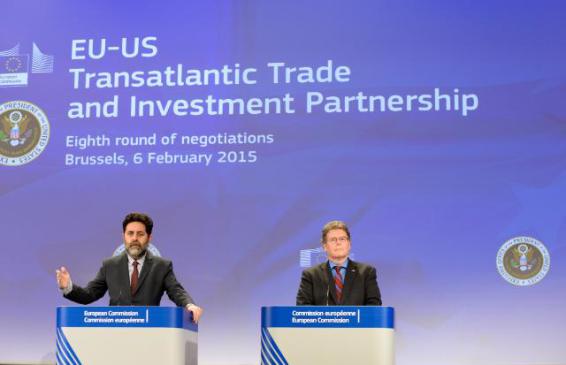I write tomorrow for The National Interest that the Obama administration made a deep strategic error in allowing the fight for trade promotion authority become dominated by the Trans Pacific Partnership when the Transatlantic Trade and Investment Partnership would have been an easier sell. ![]()
![]()
Now, given the difficult fight to win fast-trade promotion authority, momentum may be shifting against both the TPP and the TTIP, especially in Europe, where leftists in the European Parliament are having second thoughts. The ramifications of the Obama administration’s strategic choice will linger far into the next administration, whether Republican or Democratic.
I argue that TTIP would have been an easier (and better) trade deal for three reasons.
First, TTIP might easily launch a regulatory “race to the top,” not a “race to the bottom” from the US perspective, potentially bringing US standards higher on matters like consumer protection, environmental safeguards and labor standards:
When Vermont senator and Democratic presidential candidate Bernie Sanders argues that U.S. policy should look more like Scandinavia’s, TTIP is precisely the kind of tool that could make that happen. Instead of working with labor unions to use TTIP as an opportunity to strengthen workers’ rights, however, the Obama administration has been met with news reports detailing hidden jungle graves of smuggled migrant workers.
Second, a free trade deal with Europe makes more conceptual sense than the far-flung Pacific deal, and though the Obama administration and business interests have argued that the TPP is necessary to counter Chinese influence, TTIP could be even more important:
Moreover, it’s TTIP that arguably represents the more audacious trade play against China, because it could establish joint US-European standards across a super-market that no exporter or producer, anywhere in the world, could afford to ignore. TTIP, in short, would cement Western standards, not Chinese ones, as the global default.
Finally, it’s easier to visualize the gains from breaking down the non-tariff barriers between the United States and Europe. Though vested interests are sure to throw obstacles in the path of maximum liberalization, certainly the path for true gains is easier with TTIP than TPP:
Why protect Wisconsin and Vermont cheesemakers by banning their French counterparts? Why shouldn’t Air France be able to compete with American Airlines for domestic U.S. air travel routes? Why not be able to choose Vodafone instead of Sprint for mobile phone service — or Liberty Global instead of Comcast as an Internet provider? Why not facilitate the services of European engineering firms that have designed the fast-speed trains that put Amtrak to shame?
Moreover, there are even more tangible benefits to a successful TTIP — not vis-a-vis China in the 2020s or 2040s, but in Europe across the very short term:
TTIP could scramble the trade imbalance between Germany and the rest of the European Union that was at the heart of of the 2009-10 eurozone crisis. TTIP might also bolster EU unity if the trade deal becomes one of the many sweeteners that prevents British voters from leaving the European Union in a planned 2017 referendum. Gains from deeper trade might also boost economic growth in countries like Greece, Italy and Spain.
